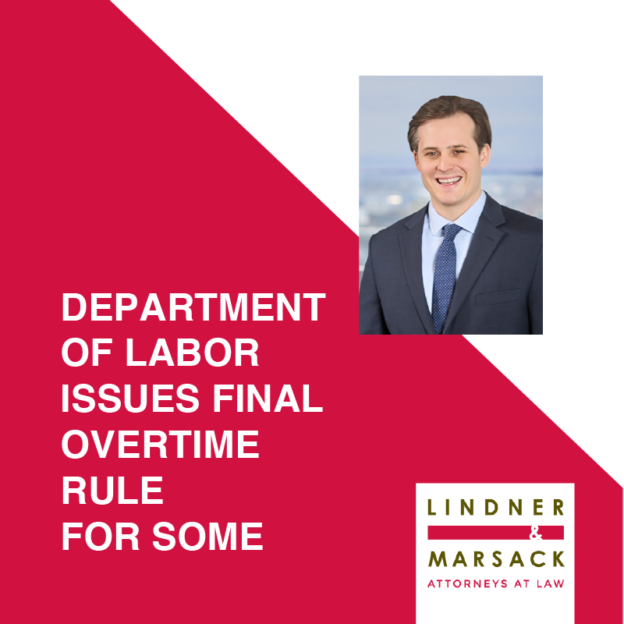By: Sean E. Lees
On April 23, 2024, the Department of Labor (DOL) issued its final overtime rule, which raised the annual salary required for certain employees to be exempt from overtime under the Fair Labor Standards Act (FLSA). While this rule will likely face legal challenges, it is scheduled to go into effect on July 1, 2024.
As a general rule, unless certain exemptions apply, employees who work more than forty (40) hours in a workweek must be paid overtime. This new rule impacts two (2) exemptions – the executive, administrative, and professional (“EAP”) exemption and the highly compensated employee (“HCE”) exemption. To qualify for the EAP exemption, the employee must meet three tests: 1) be paid a salary on a predetermined and fixed amount that is not subject to reduction based on the quality or quantity of work performed; 2) be paid at least a specified weekly salary level, and 3) perform primarily executive, administrative, or professional duties. The HCE exemption applies to employees who are paid a salary, earn above a set annual compensation threshold, and satisfy a minimal duties test.
Effective July 1, 2024, the new rule raises the minimum salary threshold for the EAP and HCE exemptions:
- Under the EAP exemption, the minimum salary threshold will be raised from $684 per week ($35,568 per year) to $844 per week ($43,888 per year);
- Under the HCE exemption, the annual compensation threshold will be increased from $107,432 per year, including at least $684 per week paid on a salary or fee basis, to $132,964 per year, including at least $844 per week paid on a salary or fee basis.
Effective January 1, 2025, the salary thresholds for these exemptions will again be raised as follows:
- The EAP minimum salary threshold will be increased to $1,128 per week ($58,656 per year);
- The HCE annual compensation threshold will be increased to $151,164 per year, including at least $1,128 per week paid on a salary or fee basis.
Effective July 1, 2027, and every three (3) years thereafter, these thresholds will be updated based on the available data used to set the salary level in effect at the time of the update.
The practical result of this rule is that many employees currently classified as exempt under the FLSA overtime rules may now fall below the adjusted minimum salary thresholds described above. Therefore, this subset of newly classified employees must be paid overtime if they work more than forty (40) hours in a given week. Employers should prepare for the implementation of this rule by analyzing the salaries of all employees currently classified as exempt to determine whether the new rules may alter their classification. During this analysis, employers should pay particular attention to employees who earn between $35,568 and $58,656 per year, as these employees are most likely to be impacted by this new rule. Employers may consider adjusting an employee’s salary in accordance with the new rule to maintain their exempt status or otherwise convert them to non-exempt status, at which point they would be eligible for overtime payments.

